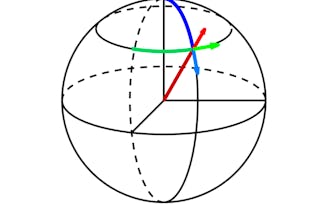This course continues your study of calculus by focusing on the applications of integration to vector valued functions, or vector fields. These are functions that assign vectors to points in space, allowing us to develop advanced theories to then apply to real-world problems. We define line integrals, which can be used to fund the work done by a vector field. We culminate this course with Green's Theorem, which describes the relationship between certain kinds of line integrals on closed paths and double integrals. In the discrete case, this theorem is called the Shoelace Theorem and allows us to measure the areas of polygons. We use this version of the theorem to develop more tools of data analysis through a peer reviewed project.

Calculus through Data & Modelling: Vector Calculus

Calculus through Data & Modelling: Vector Calculus
This course is part of Integral Calculus through Data and Modeling Specialization

Instructor: Joseph W. Cutrone, PhD
Top Instructor
4,126 already enrolled
Included with
48 reviews
Recommended experience
Skills you'll gain
- Vector Databases
- Spatial Data Analysis
- Physics
- Calculus
- Advanced Mathematics
- Mathematical Modeling
- Integral Calculus
- Data Integration
- Geometry
- Mathematical Theory & Analysis
- Applied Mathematics
- Skills section collapsed. Showing 10 of 11 skills.
Details to know

Add to your LinkedIn profile
See how employees at top companies are mastering in-demand skills

Build your subject-matter expertise
- Learn new concepts from industry experts
- Gain a foundational understanding of a subject or tool
- Develop job-relevant skills with hands-on projects
- Earn a shareable career certificate

There are 3 modules in this course
In this module, we define the notion of a Vector Field, which is a function that applies a vector to a given point. We then develop the notion of integration of these new functions along general curves in the plane and in space. Line integrals were developed in the early19th century initially to solve problems involving fluid flow, forces, electricity, and magnetism. Today they remain at the core of advanced mathematical theory and vector calculus.
What's included
2 videos2 readings1 assignment
In this module, we introduce the notion of a Conservative Vector Field. In vector calculus, a conservative vector field is a vector field that is the gradient of some function f, called the potential function. Conservative vector fields have the property that the line integral is path independent, which means the choice of any path between two points does not change the value of the line integral. Conversely, path independence of the line integral is equivalent to the vector field being conservative. We then state and formalize an important theorem about line integrals of conservative vector fields, called the Fundamental Theorem for Line Integrals. This will allow us to show that for a conservative system, the work done in moving along a path in configuration space depends only on the endpoints of the path.
What's included
1 video2 readings1 assignment
In this module we state and apply a main tool of vector calculus: Green's Theorem. Green's theorem gives a relationship between the line integral of a two-dimensional vector field over a closed path in the plane and the double integral over the region it encloses. The fact that the integral of a two-dimensional conservative field over a closed path is zero is a special case of Green's theorem.
What's included
1 video1 reading1 assignment1 peer review
Earn a career certificate
Add this credential to your LinkedIn profile, resume, or CV. Share it on social media and in your performance review.
Instructor

Offered by
Explore more from Math and Logic
 Status: Free Trial
Status: Free TrialJohns Hopkins University
 Status: Free Trial
Status: Free TrialJohns Hopkins University
 Status: Free Trial
Status: Free TrialThe Hong Kong University of Science and Technology
 Status: Free Trial
Status: Free TrialJohns Hopkins University
Why people choose Coursera for their career

Felipe M.

Jennifer J.

Larry W.

Chaitanya A.
Learner reviews
- 5 stars
79.16%
- 4 stars
12.50%
- 3 stars
6.25%
- 2 stars
0%
- 1 star
2.08%
Showing 3 of 48
Reviewed on Mar 7, 2023
good conceptual coverage of underlying topicsthe instructor also was clear in the delivery of the content and the course progressed smoothlythe assignments were challenging but understandable
Reviewed on Jan 23, 2025
Instruction became more rushed as the material became more complex and abstract.
Reviewed on Apr 1, 2022
This is an excellent course to learn advanced calculus. Very well taught!

Open new doors with Coursera Plus
Unlimited access to 10,000+ world-class courses, hands-on projects, and job-ready certificate programs - all included in your subscription
Advance your career with an online degree
Earn a degree from world-class universities - 100% online
Join over 3,400 global companies that choose Coursera for Business
Upskill your employees to excel in the digital economy
Frequently asked questions
To access the course materials, assignments and to earn a Certificate, you will need to purchase the Certificate experience when you enroll in a course. You can try a Free Trial instead, or apply for Financial Aid. The course may offer 'Full Course, No Certificate' instead. This option lets you see all course materials, submit required assessments, and get a final grade. This also means that you will not be able to purchase a Certificate experience.
When you enroll in the course, you get access to all of the courses in the Specialization, and you earn a certificate when you complete the work. Your electronic Certificate will be added to your Accomplishments page - from there, you can print your Certificate or add it to your LinkedIn profile.
Yes. In select learning programs, you can apply for financial aid or a scholarship if you can’t afford the enrollment fee. If fin aid or scholarship is available for your learning program selection, you’ll find a link to apply on the description page.
More questions
Financial aid available,
¹ Some assignments in this course are AI-graded. For these assignments, your data will be used in accordance with Coursera's Privacy Notice.

